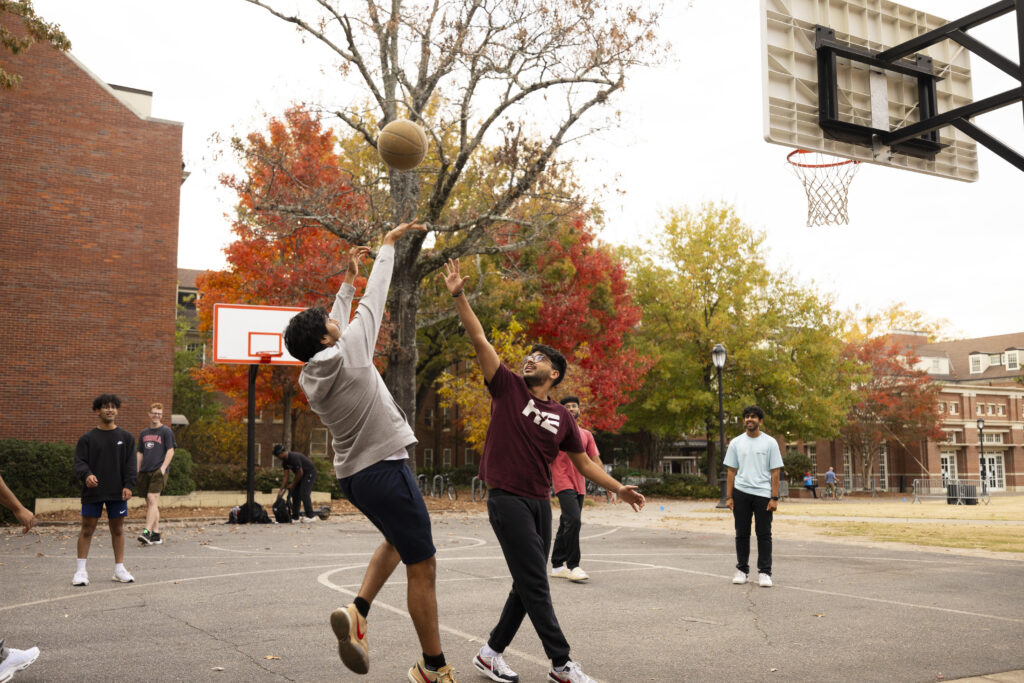
Students play a game of pickup basketball on the courts at Myers Hall (Photo by Andrew Davis Tucker/UGA Marketing & Communications)
Whether you’re just starting to work out or looking to amp up your workout routine, how you eat before, during, and after exercise will support your level of fitness. We can use proper nutrition to perform our best, continue making progress, and support essential recovery. Food is fuel!
Pre-Workout
Before a workout, the focus is primarily on carbohydrates, the preferred energy source for your muscles and brain.
Generally we should aim to add a variety of whole grains to our diet when we can because eating only simple, refined carbohydrates can mean missing out on important nutrients. However, sometimes simple sugars are the best option – for example, right before a workout they will provide the fastest energy and are less likely to result in indigestion.
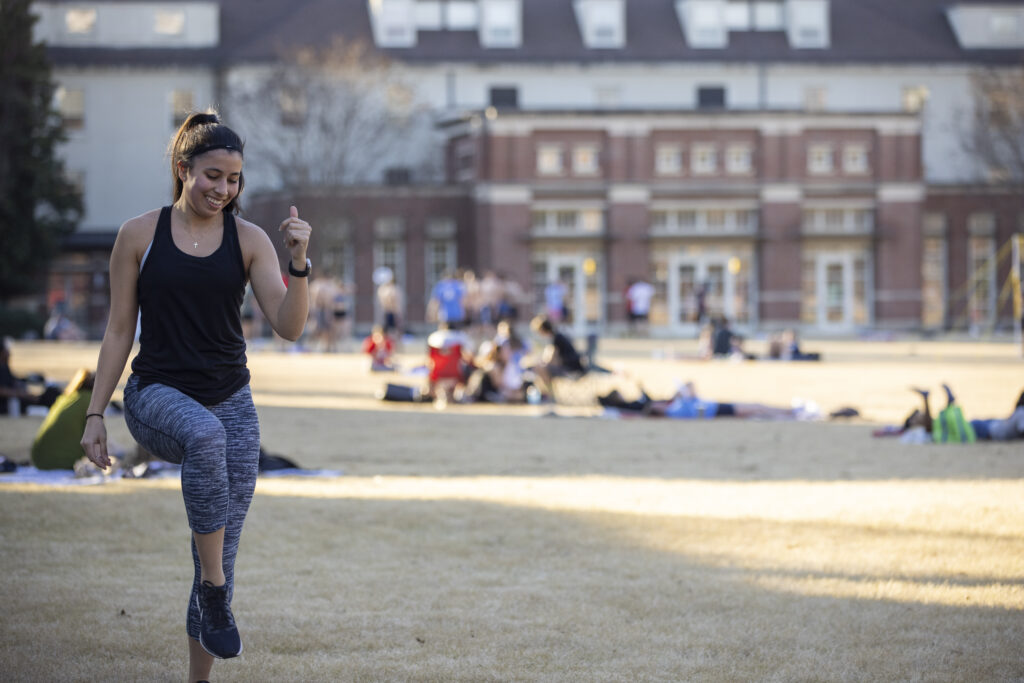
Rec Sports graduate assistant Montse Molas leads a dance-based pop-up fitness class on Myers Quad. (Photo by Dorothy Kozlowski/UGA Marketing & Communications)
If you prefer to exercise first thing in the morning, you may find that eating something small will help you feel more energized during your workout. Fuel with food, especially if you wake up hungry or if your exercise will last longer than 45 minutes. Try a couple of dates, a banana, some granola, or an energy bar for a high-carbohydrate, low-fiber snack.
If you don’t wake up hungry but know that some fuel in your tank will help you feel better during your workout, choose a drink with quick absorbing carbohydrate like orange juice. Adding even a teaspoon of honey or some sugar to your coffee can make a big difference.
Caffeine can also support performance by providing energy and focus but should never be used in place of adequate nutrition.
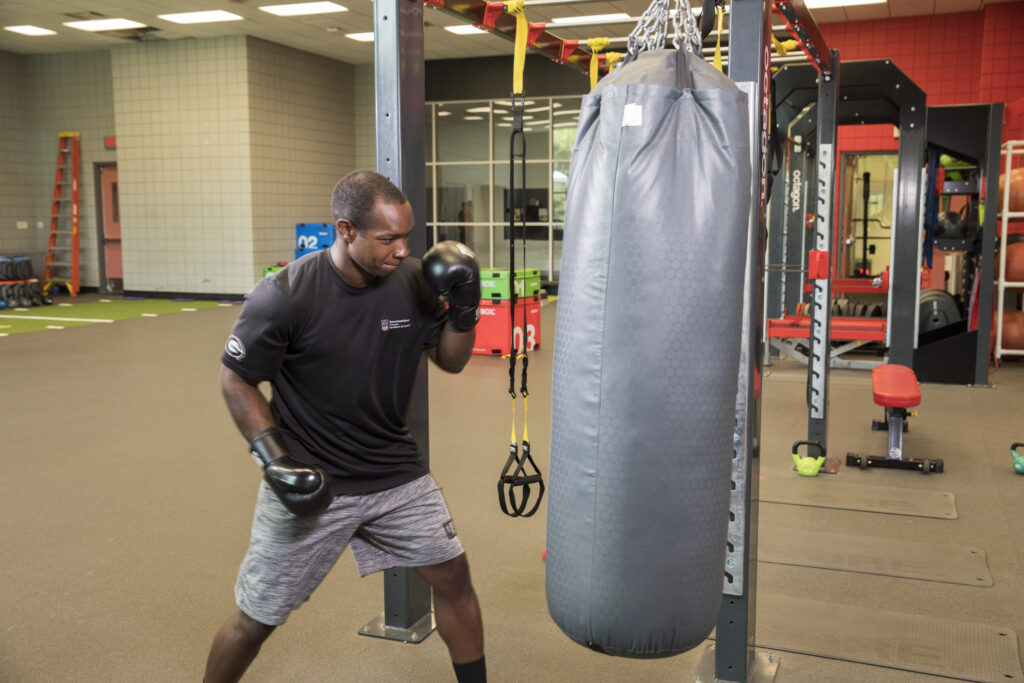
Student military veteran and personal trainer Jvonte Ross boxes at the Ramsey Student Center. (Photo by Peter Frey/UGA Marketing & Communications)
The myths that working out fasted will result in more fat loss than working out fed are largely debunked. You may have less energy if you work out fasted, which may hinder your performance, lead to a less effective workout, and you might feel worse throughout the day.
By working out consistently, especially considering endurance exercise, your body becomes more efficient at using fat as energy instead of carbohydrates as fuel. Thus, if fat loss is a performance goal, it may be smarter to fuel before a workout so you can go longer and faster, training your metabolism to support your fitness goals.

Students play pickle ball at the IM Fields. (Photo by Chamberlain Smith/UGA Marketing & Communications)
If you’re working out later in the day, try to consume a balanced meal 3-4 hours before you plan to exercise that includes a source of carbohydrates, protein, and healthy fats. This will allow enough time for your body to digest, so the energy from your food can be put to use.
Some balanced lunch ideas for an afternoon workout are a sandwich with lean protein and a side of fruit, pasta salad with assorted vegetables and Italian dressing, or a pita with hummus, veggies, and your preferred protein source.
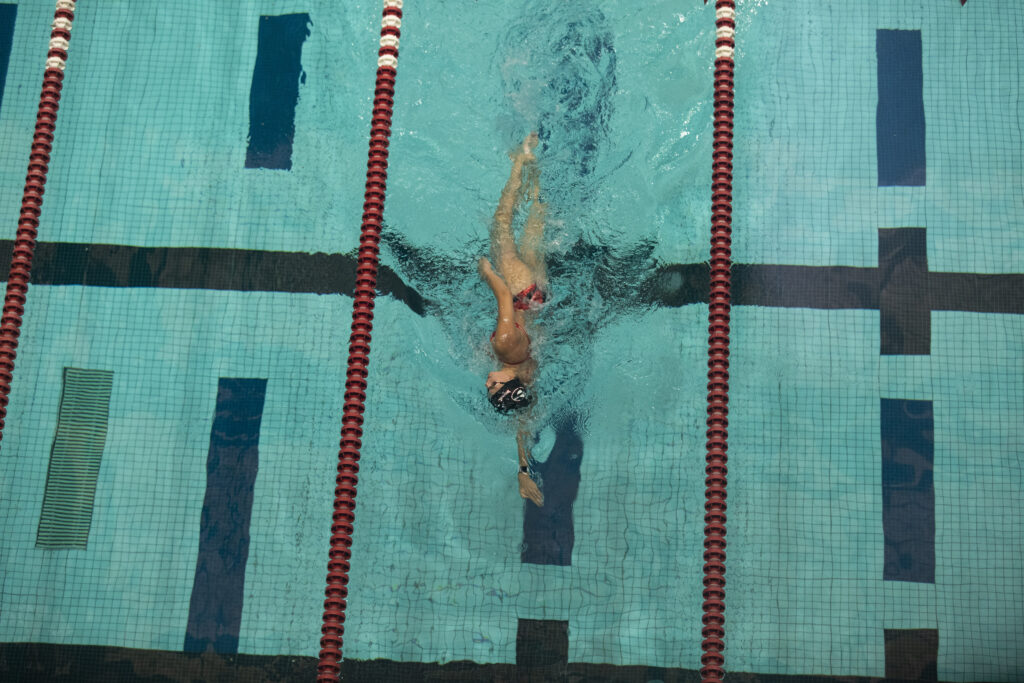
A student swims in the lanes at the natatorium in the Ramsey Center. (Photo by Andrew Davis Tucker/UGA Marketing & Communications)
Try to avoid foods high in fat (fried foods, greasy foods, lots of peanut butter) and fiber (cruciferous vegetables, beans, legumes, whole grains) too close to a workout; these take a longer time to digest and may cause digestion issues during exercise.
If you feel hungry about an hour before a workout, a small carbohydrate-rich snack can keep you from feeling weak during your session. Some of my favorites are a sports drink, fruit snacks, pretzels, or a piece of fruit. Consider peeling your fruit (apples always give me problems right before a run; the skin contains a lot of fiber).
During Exercise
During exercise, your body pulls first from the energy reserves in your muscle, liver, and brain (carbohydrates), then eventually from fat stores. These stored energy sources are broken down into immediate energy to fuel exercise.

Students play games at the R Haven Overnight Family Park near Rising Fawn, GA. (Photo by Dorothy Kozlowski/UGA Marketing & Communications)
Our muscles store enough energy as glycogen (the storage form of carbohydrates) to last about 60-90 minutes of exercise. Most recreational athletes don’t need to worry about fuel during exercise if they are mindful of pre-and post-workout nutrition and stay hydrated with water.
However, for activities lasting longer than an hour, consuming simple carbohydrates (sports drinks, small orange, fruit snack) will provide energy to sustain performance and prevent the loss of lean mass (a.k.a. muscle).
Fuel consumed during exercise should be simple sugars, as they are the fastest absorbed and used as energy. Guidelines recommend consuming 30-60 grams of carbohydrates per hour after one hour of exercise.
Sports drinks, performance gels, and chews are engineered to provide a blend of sugar 9carbohydrate) and electrolytes to support continued, long performance. Other carbohydrate-rich options are about a 100-calorie serving of applesauce, fruit snacks/juice, or dates.
After Exercise
After exercising, it’s critical to replenish your energy stores and provide enough nutrition to support recovery.
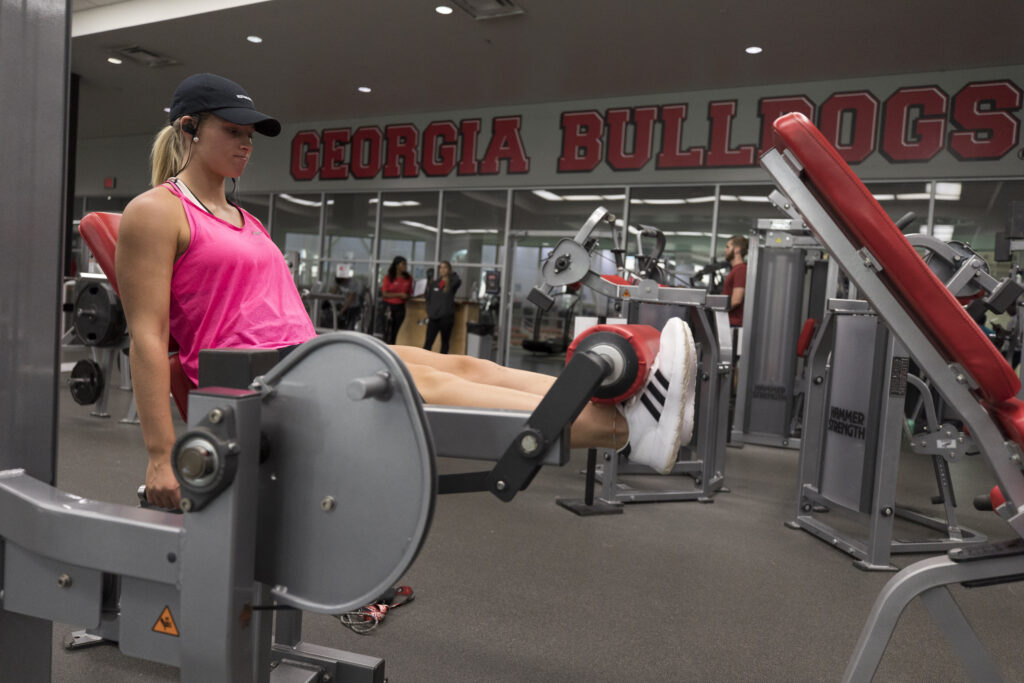
Undergraduate student Ivey Ginn works out in the Ramsey Student Center weight room. (Photo by Andrew Davis Tucker/UGA Marketing & Communications)
Most people know that it’s important to eat protein after exercise. Stress from exercise creates many microtears in our muscles, which is why we feel sore as they’re repaired.
When we eat protein, its amino acid building blocks are shuttled to the site of damage to repair the microtears so our muscles are stronger the next time we exercise. About 20 grams of protein is enough to support muscle synthesis and recovery.
Less known is the importance of carbohydrates after exercise. When our body senses carbohydrates, it releases insulin to keep our blood sugar in check. Insulin also helps our body build tissues, which is helpful after exercise to repair and build muscle mass. So carbohydrates actually aid in building muscle mass.
Carbohydrates also replenish the glycogen stores in your muscles used during training to prepare you for your next session. Consuming adequate carbohydrate after a training is essential in increasing endurance and preventing fatigue during your next training session.
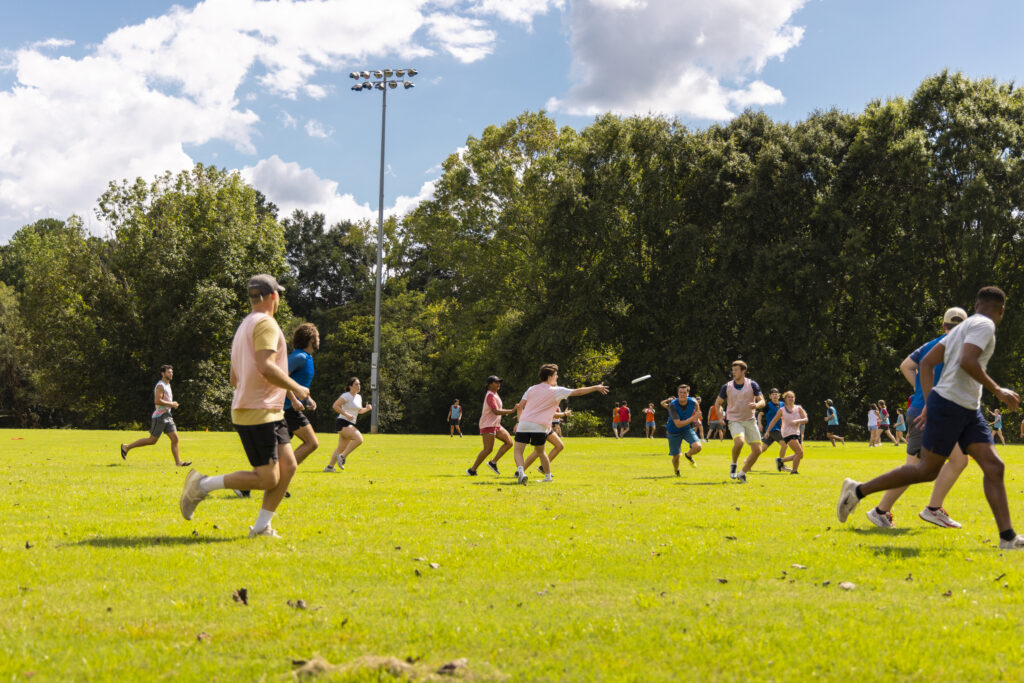
Students gather on the IM fields at Lake Herrick for Frisbee Friday hosted by RUF. (Photo by Chamberlain Smith/UGA Marketing & Communications)
Timing of nutrition after exercise is critical. To preserve lean mass and support recovery, try to eat a balanced meal or snack containing protein and carbohydrates 30-60 minutes after exercise.
If you don’t have time for a full meal, a quick snack like chocolate milk, a bagel with nut butter, Greek yogurt with granola, crackers with meat and cheese, or trail mix will support recovery while providing both protein and carbohydrates.

(L-R) Undergraduate students Sierra Shippee and Mercedes Bangs enjoy an afternoon on Lake Herrick on paddleboards. (Photo by Dorothy Kozlowski/UGA Marketing & Communications)
If you want to keep feeling stronger, faster, and more powerful in the gym, focusing on the foods you eat around each workout might help you reach your fitness goals. If you have questions or concerns, a Registered Dietitian Nutritionist can help make an individualized nutrition plan based on your personal goals.
Check out these resources to schedule an appoint with a Registered Dietitian Nutritionist:
Nutrition Services at the UGA Health Center
Nutrition Counseling at UGA Dining Services
References
Kristin I. Stanford, Roeland J.W. Middelbeek, Laurie J. Goodyear; Exercise Effects on White Adipose Tissue: Beiging and Metabolic Adaptations. Diabetes 1 July 2015; 64 (7): 2361–2368. https://doi.org/10.2337/db15-0227
MedlinePlus [Internet]. Vorvick (MD). National Library of Medicine (US). [updated 2023 April 27; cited 2024 May 28]. Available from: https://medlineplus.gov/ency/article/002458.htm
van Loon L. J. (2013). Role of dietary protein in post-exercise muscle reconditioning. Nestle Nutrition Institute workshop series, 75, 73–83. https://doi.org/10.1159/000345821
Wildman, Robert PhD, RD1; Kerksick, Chad PhD, ATC, CSCS*D, NSCA-CPT*D2; Campbell, Bill PhD, CSCS3. Carbohydrates, Physical Training, and Sport Performance. Strength and Conditioning Journal 32(1):p 21-29, February 2010. | DOI: 10.1519/SSC.0b013e3181bdb161
Zouhal, H., Saeidi, A., Salhi, A., Li, H., Essop, M. F., Laher, I., Rhibi, F., Amani-Shalamzari, S., & Abderrahman, A. B. (2020). Exercise Training and Fasting: Current Insights. Open Access Journal of Sports Medicine, 11, 1-28. https://doi.org/10.2147/OAJSM.S224919

